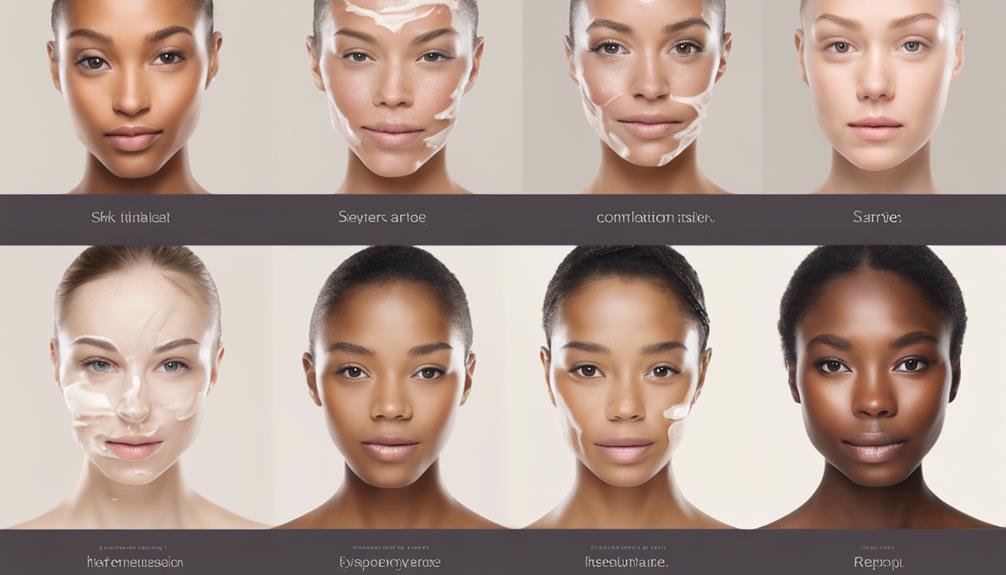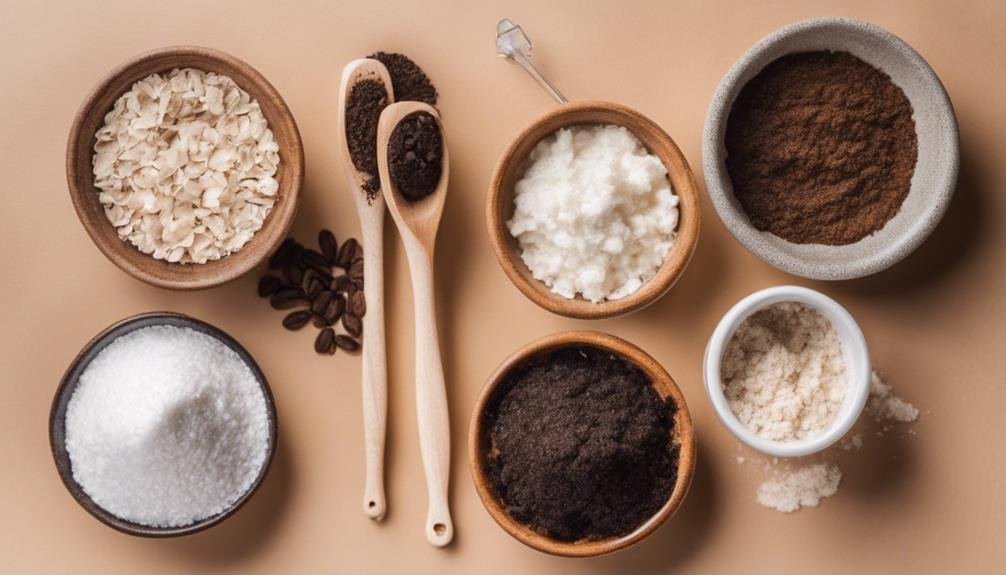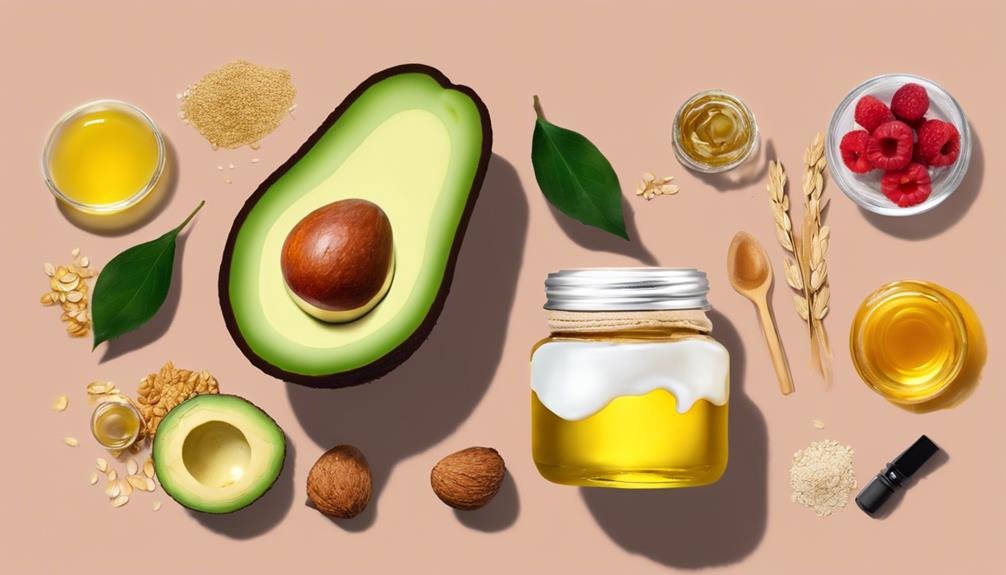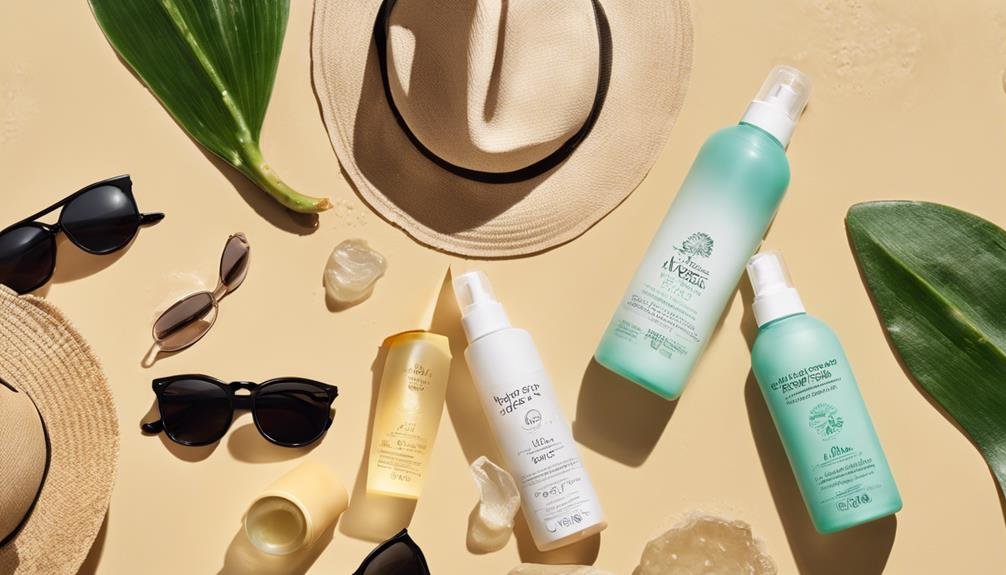Natural Skincare Tips for Every Skin Type
For optimal skin health, understanding your skin type is crucial. Oily, dry, sensitive, or combination skin all have unique needs that can be addressed with natural skincare tips. From balancing oil production to soothing irritation, there are specific remedies tailored to each skin type. By incorporating the right ingredients and practices into your skincare routine, you can achieve a radiant complexion that looks and feels its best.
Key Takeaways
- Customize skincare with natural ingredients for each skin type.
- Hydrate skin with natural serums and adequate water intake.
- Use essential oils tailored to your skin type for added benefits.
- Incorporate DIY face masks for budget-friendly, skin-specific care.
- Prioritize sun protection with broad-spectrum sunscreen to prevent aging and skin damage.
Skin Type Overview

When it comes to understanding your skin type, it's essential to recognize that each person's skin is unique and may fall into one of the primary categories: oily, dry, combination, or sensitive. Identifying your skin type is the first step towards developing an effective skincare routine tailored to your specific needs.
Oily skin tends to produce excess sebum, leading to a shiny complexion and potential acne breakouts.
Dry skin lacks moisture, often feeling tight and rough, with possible flakiness.
Combination skin exhibits characteristics of both oily and dry skin, typically oily in the T-zone and dry in other areas.
Sensitive skin is prone to irritation, redness, and reactions to certain products or environmental factors.
Oily Skin Care
To effectively manage oily skin, it's crucial to establish a skincare routine that targets excessive sebum production and helps maintain a balanced complexion. Start by cleansing your face twice daily with a gentle, oil-free cleanser to remove impurities and control oiliness.
Incorporate a toner containing ingredients like witch hazel or tea tree oil to help minimize pores and reduce excess oil. Exfoliate 1-2 times a week with a gentle scrub to prevent buildup and keep skin smooth.
Opt for lightweight, non-comedogenic moisturizers to hydrate without clogging pores. Look for products with ingredients like hyaluronic acid or glycerin. Use a clay mask once a week to help absorb excess oil and clarify the skin.
Lastly, always remember to wear sunscreen to protect your skin and prevent oiliness from worsening. By following these steps consistently, you can effectively manage oily skin and achieve a healthier, more balanced complexion.
Dry Skin Solutions

Managing dry skin requires a tailored skincare regimen to nourish and hydrate your complexion effectively. Dry skin can feel tight, flaky, and sometimes itchy, requiring special attention to maintain its moisture balance. Here are some natural solutions to help you combat dry skin:
| Skincare Tips | Description | Benefits |
|---|---|---|
| Use a gentle cleanser | Opt for a hydrating cleanser that doesn't strip away natural oils. | Retains skin moisture |
| Hydrating masks | Apply a hydrating mask weekly to replenish lost moisture. | Restores skin's suppleness |
| Moisturize regularly | Use a rich moisturizer with ingredients like hyaluronic acid or glycerin. | Locks in moisture |
| Exfoliate gently | Exfoliate with a mild scrub to remove dead skin cells without irritation. | Enhances skin texture |
| Drink plenty of water | Stay hydrated from within to keep your skin hydrated and healthy. | Improves overall skin health |
Sensitive Skin Remedies
For individuals with sensitive skin, finding the right skincare remedies is crucial to prevent irritation and maintain a healthy complexion. Sensitive skin can react adversely to various products, weather conditions, and environmental factors. When caring for sensitive skin, it's essential to opt for gentle, fragrance-free products that are hypoallergenic and free from harsh chemicals.
One of the key remedies for sensitive skin is to keep your skincare routine simple. Use a mild, non-abrasive cleanser to gently cleanse your face without stripping away natural oils.
Moisturize with a fragrance-free, hypoallergenic moisturizer to keep your skin hydrated and protected. Additionally, always remember to patch-test new products before applying them to your face to avoid triggering any reactions.
Incorporating natural ingredients like aloe vera, oatmeal, and chamomile can also help soothe sensitive skin. These ingredients have anti-inflammatory properties that can calm irritation and redness.
Combination Skin Tips

Navigating the realm of skincare can be challenging, especially when your skin seems to have a mind of its own. Combination skin, characterized by having both oily and dry areas, requires a balanced approach to maintain its health and appearance. Here are some tips tailored for your combination skin:
- Hydration is Key: Opt for lightweight, non-comedogenic moisturizers to hydrate dry areas without making oily areas greasy.
- Gentle Cleansing: Use a gentle, pH-balanced cleanser to avoid stripping the skin of its natural oils.
- Targeted Treatments: Consider using different products for oily and dry areas to address specific concerns effectively.
- Sun Protection: Always apply a broad-spectrum sunscreen to shield your skin from harmful UV rays, regardless of your skin type.
Cleansing Techniques
To maintain healthy and radiant skin, mastering effective cleansing techniques is essential. Start by choosing a gentle, natural cleanser suitable for your skin type.
For dry skin, opt for creamy cleansers that hydrate while cleansing. Oily or acne-prone skin benefits from foaming cleansers with ingredients like tea tree oil or salicylic acid. If you have sensitive skin, go for fragrance-free and hypoallergenic cleansers to avoid irritation.
When cleansing, use lukewarm water as hot water can strip the skin of its natural oils. Gently massage the cleanser onto your skin in circular motions, focusing on areas prone to breakouts or excess oil. Be mindful not to scrub too harshly, as this can irritate the skin. Rinse thoroughly and pat your skin dry with a soft towel.
Make cleansing a part of your daily skincare routine, both in the morning and at night, to remove dirt, oil, and impurities that can accumulate throughout the day. Consistent and proper cleansing paves the way for healthier, more vibrant skin.
Exfoliation Methods

Regular exfoliation is a crucial step in any skincare routine to promote smooth, glowing skin. Exfoliating helps remove dead skin cells, unclog pores, and improve skin texture. Here are some effective exfoliation methods to consider:
- Physical Exfoliation: This method involves using granular substances like sugar or oatmeal to physically scrub away dead skin cells. Be gentle to avoid irritation.
- Chemical Exfoliation: Chemical exfoliants like alpha-hydroxy acids (AHAs) and beta-hydroxy acids (BHAs) work by dissolving dead skin cells. They can be more gentle and effective for certain skin types.
- Enzyme Exfoliation: Enzymes derived from fruits like papaya and pineapple can help gently exfoliate the skin without scrubbing. Great for sensitive skin.
- Exfoliating Tools: Tools like facial brushes or exfoliating gloves can enhance your exfoliation routine. Remember to keep them clean to prevent bacteria buildup.
Experiment with these methods to find what works best for your skin type. Always follow up with a moisturizer to keep your skin hydrated and healthy.
Hydration Boosters
After effectively exfoliating your skin, ensuring proper hydration is essential for maintaining a healthy and radiant complexion. Hydration boosters play a crucial role in keeping your skin moisturized and glowing. Opt for natural ingredients like hyaluronic acid, aloe vera, or glycerin to replenish your skin's moisture levels. These ingredients have humectant properties, attracting water molecules to the skin and locking in moisture.
Consider incorporating a hydrating serum into your skincare routine. Serums are lightweight and easily absorbed, delivering a concentrated dose of hydration to the skin. Look for serums with ingredients like vitamin E or niacinamide, known for their hydrating and skin-barrier-strengthening benefits.
Additionally, don't forget the importance of drinking an adequate amount of water throughout the day. Proper hydration from within can significantly impact the external appearance of your skin. Aim to drink at least eight glasses of water daily to keep your skin hydrated and supple.
DIY Face Masks

Before diving into the world of DIY face masks, it's important to understand the benefits of incorporating them into your skincare routine. DIY face masks can provide a natural and effective way to nourish and rejuvenate your skin, tailored to your specific needs. Here are some reasons why DIY face masks are a great addition to your skincare regimen:
- Customization: You have full control over the ingredients, allowing you to cater to your skin's unique requirements.
- Cost-effective: Making your own face masks can be budget-friendly compared to store-bought options.
- Natural Ingredients: You can avoid harsh chemicals and artificial fragrances by using natural ingredients from your kitchen.
- Relaxation: Applying a DIY face mask can also be a soothing self-care ritual, promoting relaxation and reducing stress levels.
Essential Oils Guide
Exploring the world of natural skincare often leads to the utilization of essential oils. These potent plant extracts can offer a wide range of benefits for your skin.
For oily skin, tea tree oil is a great choice due to its antibacterial properties.
If you have dry skin, opt for oils like rosehip or jojoba to deeply moisturize and nourish.
Those with sensitive skin may find relief in chamomile or lavender essential oils, known for their soothing and calming effects.
Essential oils can be used in various ways in your skincare routine. You can add a few drops to your moisturizer, create a customized face oil blend, or even mix them into your DIY face masks for enhanced benefits. However, it's crucial to remember that essential oils are highly concentrated and should always be diluted before applying to the skin to prevent irritation.
When selecting essential oils, prioritize quality and purity to ensure you're reaping the full benefits without any synthetic additives. Always perform a patch test before applying them to your face to avoid any adverse reactions.
Sun Protection Essentials

When it comes to maintaining healthy skin, protecting yourself from the harmful effects of the sun is essential. Sun protection is crucial for preventing premature aging, reducing the risk of skin cancer, and maintaining an even skin tone. Here are some sun protection essentials to keep your skin healthy and radiant:
- Broad-spectrum sunscreen: Look for a sunscreen that protects against both UVA and UVB rays with an SPF of 30 or higher.
- Sun-protective clothing: Wear hats, sunglasses, and clothing with UPF (Ultraviolet Protection Factor) for added sun protection.
- Seek shade: Limit your time in direct sunlight, especially during peak hours between 10 a.m. and 4 p.m.
- Stay hydrated: Drinking plenty of water helps keep your skin hydrated and supports its natural defenses against sun damage.
Nighttime Skincare Routine
As the day comes to a close, your skin undergoes a natural healing and regeneration process during the night. Taking care of your skin before bedtime is crucial for maintaining its health and youthfulness. Establishing a nighttime skincare routine can help repair damage from the day and prepare your skin for the challenges ahead. Here's a simple guide to help you create an effective nighttime skincare regimen:
| Step | Product | Purpose |
|---|---|---|
| 1. Cleansing | Gentle cleanser | Remove dirt and impurities |
| 2. Toning | Alcohol-free toner | Restore skin's pH balance |
| 3. Treatment | Serum or treatment | Target specific skin concerns |
| 4. Moisturizing | Night cream | Hydrate and nourish the skin |
Frequently Asked Questions
Can Natural Skincare Products Cause Allergic Reactions?
Yes, natural skincare products can cause allergic reactions. It's essential to perform patch tests before full application. Look for common allergens like essential oils, fragrances, and botanical extracts. Consult with a dermatologist if reactions occur.
Are There Any Natural Remedies for Hormonal Acne?
Yes, there are natural remedies for hormonal acne. Tea tree oil, evening primrose oil, and green tea extract can help balance hormones and reduce acne. Remember to patch test and consult a dermatologist for personalized advice.
How Can I Address Skin Concerns From Wearing Masks?
To address skin concerns from wearing masks, cleanse your face twice daily, choose breathable fabrics, and moisturize regularly. Avoid wearing makeup under masks and incorporate gentle exfoliation to prevent breakouts and irritation.
What Is the Best Way to Treat Skin Redness Naturally?
To treat skin redness naturally, soothe it with a cold compress, apply aloe vera gel, or use chamomile tea bags as a gentle toner. Hydrate with water and avoid harsh products. Consult a dermatologist if redness persists.
Are There Specific Natural Ingredients for Anti-Aging Skincare?
You can incorporate natural ingredients like retinol-rich rosehip oil, collagen-boosting ginseng, and antioxidant-packed green tea into your anti-aging skincare routine. These powerhouse ingredients can help combat fine lines, wrinkles, and promote youthful skin.
Conclusion
In conclusion, taking care of your skin with natural products tailored to your specific skin type is essential for a healthy complexion. Are you ready to make the switch to natural skincare and see the amazing benefits for yourself? Remember to stay consistent with your skincare routine and always prioritize gentle, soothing ingredients to keep your skin looking and feeling its best.








